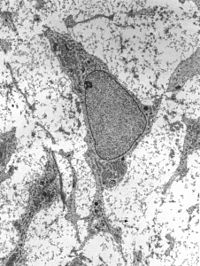
Photo from wikipedia
Mesenchymal stem cells (MSCs) exert potent immuno-regulatory activities on various immune cells and also differentiate into various mesodermal lineages besides retaining a distinct self-renewal ability. Such exclusive characteristics had enabled… Click to show full abstract
Mesenchymal stem cells (MSCs) exert potent immuno-regulatory activities on various immune cells and also differentiate into various mesodermal lineages besides retaining a distinct self-renewal ability. Such exclusive characteristics had enabled MSCs to be recognised as an ideal source for cell-based treatment in regenerative medicine and immunotherapy. Thus, considering MSCs for treating degenerative disease of organs with limited regenerative potential such as cartilage would serve as an ideal therapy. This study explored the feasibility of generating human cartilage-derived MSCs (hC-MSCs) from sports injured patients and characterised based on multipotent differentiation and immunosuppressive activities. Cartilage tissues harvested from a non-weight bearing region during an arthroscopy procedure were used to generate MSCs. Despite the classic morphology of fibroblast-like cells and a defined immunophenotyping, MSCs expressed early embryonic transcriptional markers (SOX2, REX1, OCT4 and NANOG) and differentiated into chondrocytes, adipocytes and osteocytes when induced accordingly. Upon co-culture with PHA-L activated T-cells, hC-MSCs suppressed the proliferation of the T-cells in a dose-dependent manner. Although, hC-MSCs did not alter the activation profile of T cells significantly, yet prevented the entering of activated T cells into S phase of the cell cycle by cell cycle arrest. The present study has strengthened the evidence of tissue-resident mesenchymal stem cells in human cartilage tissue. The endogenous MSCs could be an excellent tool in treating dysregulated immune response that associated with cartilage since hC-MSCs exerted both immunosuppressive and regenerative capabilities.
Journal Title: Cytotechnology
Year Published: 2017
Link to full text (if available)
Share on Social Media: Sign Up to like & get
recommendations!